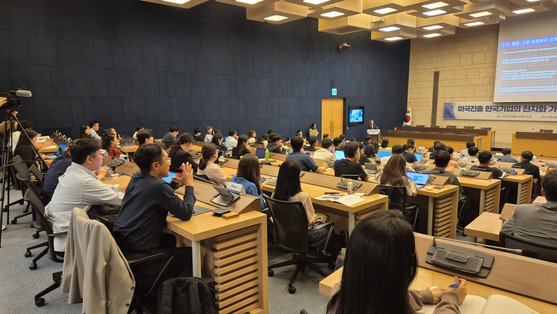HRCap CEO Delivers U.S. Market Entry and HR Localization Solutions at KCCI Seminar
- Ji Min Yoo
- Sep 26, 2025
- 4 min read
Updated: Oct 9, 2025
Localization as the Breakthrough Through Collaboration
Written by HRCap
Published September 26, 2025

On Thursday, September 25, 2025, the Korea Chamber of Commerce and Industry (KCCI) hosted a seminar titled “Localization Guide and Total HR Solutions for Korean Companies Entering the U.S.” at the KCCI Chamber Hall in Seoul, South Korea.
HRCap Founder, CEO & President Andrew Sungsoo Kim has been honorably invited to speak as the distinguished lecturer to address the growing management challenges faced by Korean companies entering and operating in the United States.
Key executive,s including Il-jun Park, Executive Vice Chairman of KCCI, and Jongwon Park, Deputy Minister for Trade at the Ministry of Trade, Industry and Energy, also gave their remarks at the seminar, and over 150 pre-screened and registered policymakers, business leaders across pthe rivate sectors, and major Korean media representatives attended the seminar.
The seminar provided action-based solutions and strategic recommendations for companies, government, and economic organizations for building stable and sustainable HR systems in the U.S. with proactive risk management and localization strategies. Within hours following the seminar, close to 20 media institutions covered the high-profile event to emphasize the seminar's efficacy and the urgency of CEO Kim's breakthrough strategic recommendations.
[Related: HRCap CEO Andrew Sungsoo Kim Receives Widespread Coverage by Major Korean Media for KCCI Seminar Address ]
Risk Management and Localization Solutions
The seminar was organized into two key sessions followed by an extensive FAQ session. CEO Andrew Sungsoo Kim spoke for approximately 125 minutes, followed by 25 minutes of open Q&A.
CEO Andrew Sungsoo Kim speaking during the KCCI-hosted seminar
The first session analyzed local U.S. responses to recent risks. It examined how companies are currently addressing them, ultimately presenting localization as the critical strategy for successfully settling into the American market.
Local U.S. perspectives emphasized that Korean companies have not sufficiently expanded local employment opportunities, and reaffirmed the principle prohibiting misaligned employment purposes, stressing that non-compliance with U.S. laws and regulations is unacceptable. While investment itself was welcomed, the U.S. government noted that companies must now focus on genuine job creation and workforce training for local communities. They added that to ensure investments truly benefit the local economy, companies must demonstrate operational stability even under regulatory pressure.
Korean companies, recognizing that immigration screening poses a greater risk than detainment, are developing countermeasures. Measures include prohibiting the use of ESTA for business travel as a general rule, permitting overseas travel only for employees holding appropriate visas such as B1, L1, or E2, requiring supporting documentation clearly stating company affiliation and job responsibilities, and limiting stated purposes of visit to “attending meetings, site inspections, or training.” Employees are also mandated to follow reporting protocols to legal or external relations teams in case of issues, supported by newly distributed internal manuals.
The second session focused on localization strategies required for entering the U.S. market. While the United States remains the world’s largest consumer market and a core hub for Korean exports and investments, evolving global trade dynamics, tariff pressures, strengthened immigration and visa restrictions, labor law and benefits regulations, and cultural differences are creating substantial entry barriers for Korean companies.
As a response, localization was presented as the only viable breakthrough strategy. Beyond simple recruitment, localization was defined as embedding comprehensive Total HR solutions, covering systems, institutions, and culture, into the local environment. Key solutions discussed included establishing visa and compliance frameworks, designing HR governance models based on local workforce integration, and building proactive risk management and response systems. By doing so, companies can move beyond short-term staffing solutions to achieve sustainable localization and talent development in the U.S.
Additional recommendations were made for each stakeholder group. Corporations were urged to pursue true localization to become global companies in practice, not just in name. The government was advised to act as a control tower and pursue diplomatic solutions. Economic associations were encouraged to serve as communication bridges between corporations, government, and local communities.
In Closing
CEO Kim closed the seminar, remarking that a cooperative K-HR strategy involving businesses, government, and economic organizations is essential for building a resilient system capable of withstanding global crisis. He further shared that the traditional dispatch-based model is no longer viable in today’s tightened visa environment, and Korean companies must transition to a localized HR governance framework and invest in a dual leadership model heavily optimized for U.S. laws, regulations, and labor markets. He stated that "securing a portfolio of multi-visa strategy, embedding subcontracting compliance, and building sustainable operations around localized talent are all critical and now a non-negotiable to proactively mitigate risks and secure both mid to long-term competitiveness in the United States.”
Yoon Chul-min, Head of the International Trade Division at KCCI, conveyed gratitude to HRCap and CEO Kim for thoughtfully preparing a breakthrough seminar to help Korean business leaders and government officials clearly understand the U.S. market risks with action-based strategic HR solutions. KCCI shared its commitment to work closely with the government to support member companies in building stable local operations and strengthening their global competitiveness.
Sources: HRCap, Korea Chamber of Commerce and Industry
========
Want marketing-leading updates on HR Trends, Recruiting Tips, and Career Advice?
Follow us on LinkedIn, Twitter, Instagram, or YouTube for leadership development strategies, career coaching advice, and talent analytics insights in the HR/Recruiting space












Comments